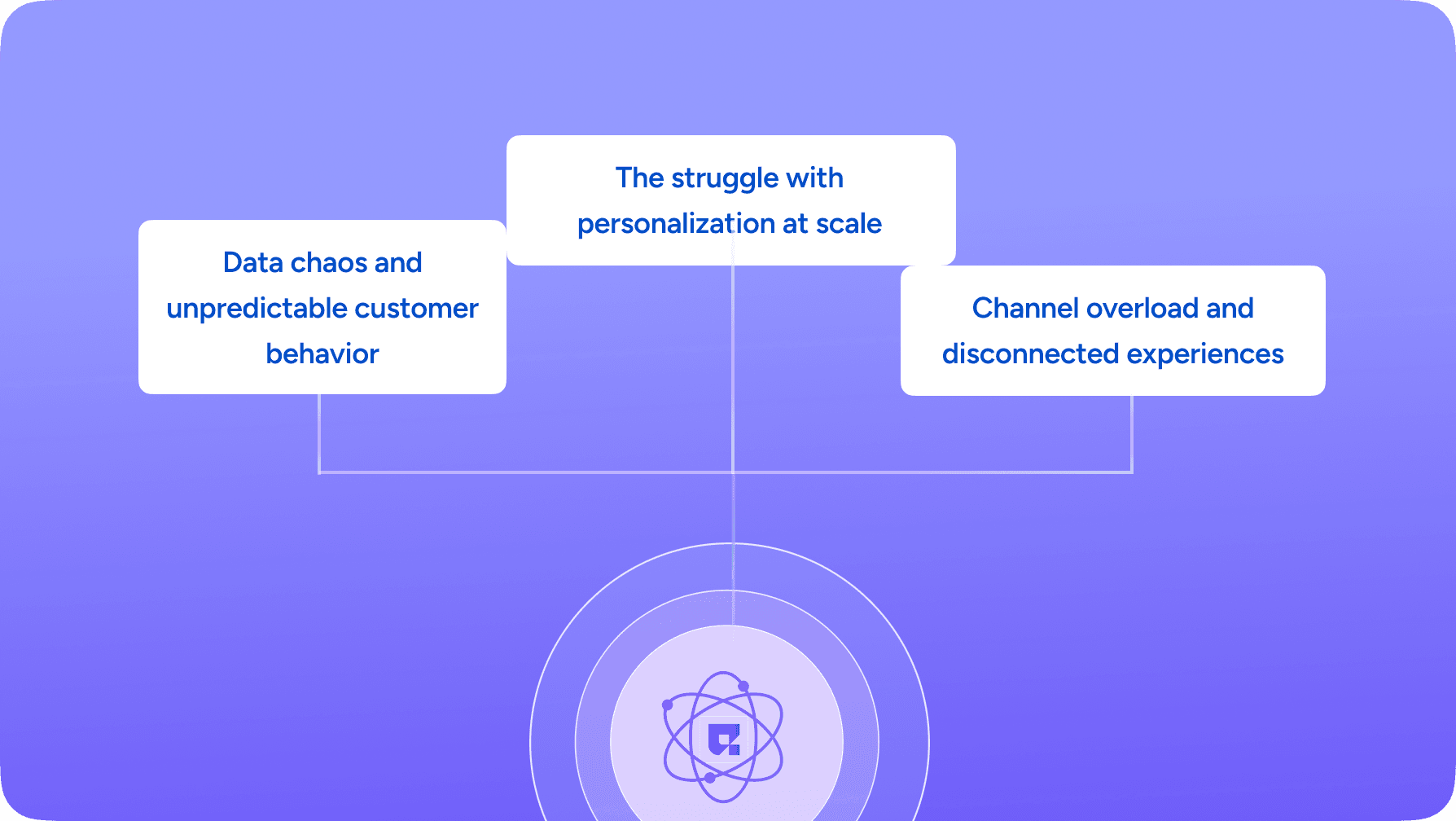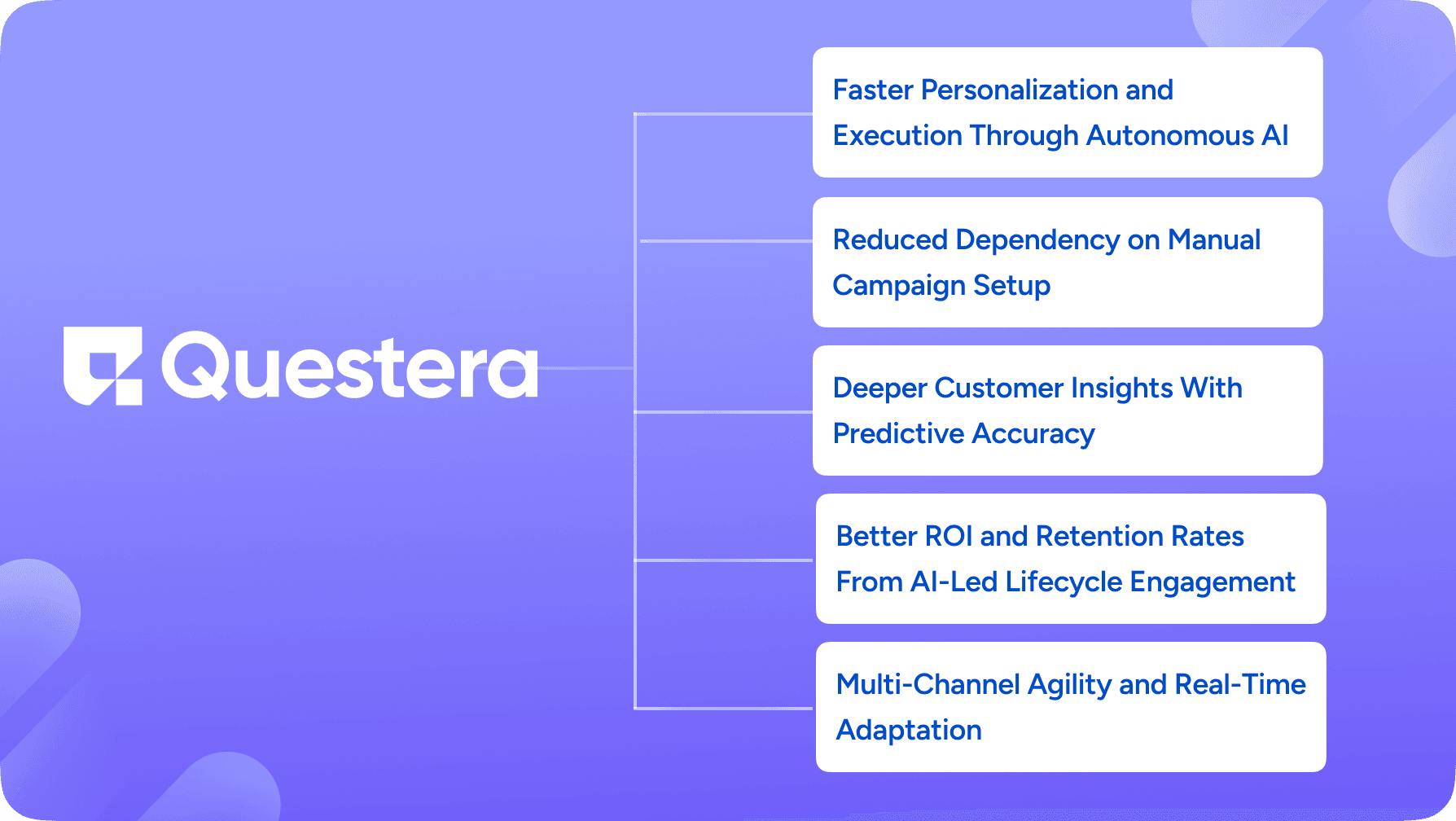Questera vs Ometria: AI Customer Engagement Compared

TL;DR
- Retailers need smarter retail customer engagement software to personalize experiences across multiple channels in real time.
- Ometria focuses on data-driven automation, offering structured workflows and useful Ometria features retail marketers rely on.
- Questera uses autonomous AI agents to predict behavior, deliver instant personalization, and optimize campaigns dynamically.
- In this customer engagement solution comparison, Questera outperforms in speed, predictive accuracy, and adaptive retail customer segmentation tools.
- Modern retailers aiming for higher ROI, better retention, and seamless engagement benefit more from retail marketing automation AI like Questera.
- Choosing between Questera vs Ometria depends on whether a brand wants structured automation or autonomous, AI-driven growth.
Retail engagement has changed more in five years than it has in the last decade. Today's shoppers expect immediate responses, personalized recommendations, and smooth experiences across every touchpoint. For this reason, retailers are transitioning from more traditional automation to retail marketing automation AI that can sense intent. This is why the Questera vs Ometria comparison is important. Both are changing the ways brands engage with customers, but they are doing it in entirely different ways. Ometria is centered around analytics and their data-driven automation, which has provided retail marketers with strong retail marketing software features that they need.
Although, Questera is working with agentic AI to create truly adaptive journeys. In this customer engagement solution study, we will see how both platforms provide assistance and redefine retail customer engagement software. Both platforms will also be examined as to which has better retail customer segmentation tools for today's modern retailers looking to grow by using smarter and more deft engagement powered by AI.
What Makes Retail Engagement So Complex Today

Data chaos and unpredictable customer behavior
Retailers today are juggling customer data from websites, apps, stores, and social channels. Data is largely siloed across networks and it becomes increasingly difficult to acquire a complete view. Shoppers browse the website, buy in-store, and expect brands to recall every experience. This is part of the problem. Conventional systems simply cannot connect touch-points and respond as those touch points occur. In this customer engagement solution examination of Questera vs Ometria, the two products take their own approaches to this process. Ometria does a nice job organizing and analyzing data, however, Questera's agentic AI is capable of learning from every user action, ultimately outpacing Ometria. This is the key difference between a solution like Questera and conventional retail customer engagement software. It matters as today, buyers are so unpredictable.
The struggle with personalization at scale
Retailers are not simply seeking to automate messages; they want every interaction to feel distinctly human. The problem with legacy retail marketing automation AI tools is that they depend too much on pre-defined workflows. When customer behavior changes overnight, these systems simply can’t keep up. That’s where the distinction between Questera vs Ometria really matters. While Ometria will still perform smart segmentation and will still have useful retail marketing features, Questera instantly adapts to the situation using intelligent retail customer segmentation tools that self-evolve. Questera will predict intent, personalize content, and send it at the perfect time. This level of flexibility will ultimately determine who retains their customers, and who loses customers to more agile and efficient engagement in today’s retail environment.
Channel overload and disconnected experiences
Retailers are now engaging customers via email, push notifications, social ads, and in-store screens- all at once! Planning, managing, and communicating through all those channels while not jeopardizing consistency feels like you are juggling too many balls. Most legacy systems were designed for a clarity that hasn’t yet crossed into this complexity - repeating messages or missing the right time altogether. That is a large reason why so many are looking beyond a layering of simple automated tools to smarter retail customer engagement software that recognizes and engages all channels in unison. This is especially apparent when you look at Questera vs Ometria. Ometria applies structure to omnichannel workflows and Questera's agentic AI connects each and every channel in real time. It observes how shoppers move from touchpoint to touchpoint, and it retools its messaging instantaneously. This is not another comparison of customer engagement solutions; it’s about who understands modern retail behavior. With the rapid evolution of retail marketing automation AI, platforms like Questera are proving how retail customer segmentation tools can create one continuous, human-like, easy conversation on all retail channels.
Ometria: Data-Driven Marketing for Retail
Ometria has built its reputation as a smart, data-focused platform for retail marketing. It gives brands a single space to organize and understand every customer interaction. Retailers use it to unify fragmented data, design automated workflows, and send relevant messages across channels. The strongest Ometria features retail marketers rely on include detailed analytics, clean segmentation, and omnichannel campaign management. It’s a solid retail customer engagement software choice for teams that love structure and precision. But when behavior shifts quickly or buyers expect instant personalization, Ometria’s automation-based design can feel a little rigid. That’s where the Questera vs Ometria debate begins between data-driven automation and true autonomy.
Questera: Agentic AI That Powers Retail Growth
Questera brings something new to the table with its retail marketing automation AI powered by agentic intelligence. Instead of static workflows, Questera uses a team of AI agents like SARA, ELMA, and SEGA that think, learn, and act on their own. They analyze shopper behavior, predict buying intent, and deliver hyper-personalized messages in real time. From recovering abandoned carts to sending lifecycle emails, everything happens automatically with precision and context. In this customer engagement solution comparison, Questera clearly leads with its predictive and self-learning system. It turns engagement into a living process, not a scheduled one. For retailers looking for adaptable retail customer segmentation tools, Questera is an upgrade to what retail customer engagement software should truly feel like: fast, personal, and deeply human.
Questera vs Ometria: Feature-by-Feature Comparison
| Feature | Questera | Ometria |
|---|---|---|
| AI Approach | Agentic AI (autonomous agents) | Predictive data analytics |
| Campaign Creation | Automated by AI agents | Manually configured workflows |
| Personalization | Real-time, multi-channel | Segmentation-based |
| Scalability | Adaptive, self-learning | Predefined automation rules |
| Integrations | Google Ads, Meta, Mixpanel, Braze, etc. | ESPs and CRM tools |
| Ideal For | Retailers focused on predictive, autonomous engagement | Retailers looking for data-led campaign automation |
Why Retailers Are Choosing Questera?

Faster Personalization and Execution Through Autonomous AI
Retailers today need to deliver the right message at the exact moment a customer shows interest. Manual campaigns often lag behind real-time behavior, leaving opportunities on the table. Questera solves this problem with autonomous AI agents that understand behavior, predict intent, and execute personalized actions instantly. Unlike traditional systems, it adapts to customer interactions as they happen, not after the fact. In the Questera vs Ometria discussion, this speed and adaptability show why Questera outperforms older automation-focused solutions. Modern retail customer engagement software must be fast, smart, and flexible, and Questera delivers exactly that.
Reduced Dependency on Manual Campaign Setup
Setting up campaigns manually consumes teams’ time and energy, often delaying outreach. Questera removes this bottleneck by automating complex decision-making. Retailers no longer need to constantly tweak workflows or adjust segments; the AI agents handle it dynamically. In this customer engagement solution comparison, Ometria provides structured automation, but Questera’s agents take full control, reducing human workload and errors. With its retail marketing automation AI, every touchpoint is optimized automatically, freeing teams to focus on strategy instead of repetitive tasks.
Deeper Customer Insights With Predictive Accuracy
Understanding your customers goes beyond historical data. Questera uses predictive analytics to foresee buying patterns, preferences, and churn risks. Its insights are richer and more actionable than traditional dashboards. While Ometria features retail marketers with detailed reports, Questera’s AI continuously learns, giving modern retailers the edge in anticipating needs. Intelligent retail customer segmentation tools create dynamic groups that evolve as customers change, ensuring messaging stays relevant.
Better ROI and Retention Rates From AI-Led Lifecycle Engagement
When engagement is precise, timely, and personalized, customers respond positively. Questera’s agentic AI ensures every campaign drives measurable results, increasing repeat purchases and loyalty. Compared to Ometria, the Questera vs Ometria debate clearly favors predictive, autonomous execution for higher ROI. Modern retailers using retail customer engagement software like Questera report better retention, reduced churn, and more efficient marketing spend.
Multi-Channel Agility and Real-Time Adaptation
Retailers communicate across email, push notifications, social media, and web, and consistency is crucial. Questera seamlessly connects all channels in real time, adjusting messages automatically based on behavior. Unlike traditional automation platforms, it doesn’t wait for scheduled updates, ensuring a coherent customer journey. In today’s fast-paced retail world, these retail customer segmentation tools combined with AI-led orchestration make Questera an indispensable choice.
Conclusion
When it comes to connecting with modern shoppers, speed, accuracy, and personalization matter more than ever. In the Questera vs Ometria debate, we see two approaches to retail customer engagement software, one focused on structured automation, the other on intelligent, autonomous action. While Ometria features retail marketers with strong analytics and organized workflows, Questera’s retail marketing automation AI adapts in real time, learning from every interaction. Its predictive retail customer segmentation tools make campaigns smarter, faster, and more relevant. This customer engagement solution comparison shows that retailers ready to deliver timely, personalized experiences at scale can gain a clear advantage with Questera. For brands aiming to grow efficiently, engage meaningfully, and retain customers, Questera is the partner that transforms insight into action effortlessly.
FAQs
1. What is the main difference between Questera and Ometria?
Questera uses autonomous AI agents for real-time, predictive engagement, while Ometria focuses on structured, data-driven automation and analytics.
2. How does Questera improve retail customer engagement?
Questera’s agentic AI analyzes behavior, predicts intent, and executes personalized campaigns automatically across multiple channels.
3. Which platform offers better segmentation tools for retailers?
Questera provides dynamic retail customer segmentation tools that evolve with customer behavior, whereas Ometria relies on fixed segments.
4. Can Ometria still be useful for retail marketers?
Yes, Ometria offers strong analytics and workflow automation that help marketers organize campaigns efficiently.
5. Do both platforms integrate with other marketing tools?
Yes, but Questera’s integrations support real-time AI actions, while Ometria focuses on structured analytics and workflow connections.
6. Why should retailers consider Questera over Ometria?
Questera combines intelligence, speed, and adaptability, making it a next-generation retail customer engagement software for modern, fast-moving shoppers.
Ready to be a
10x Marketer?
See it in action












